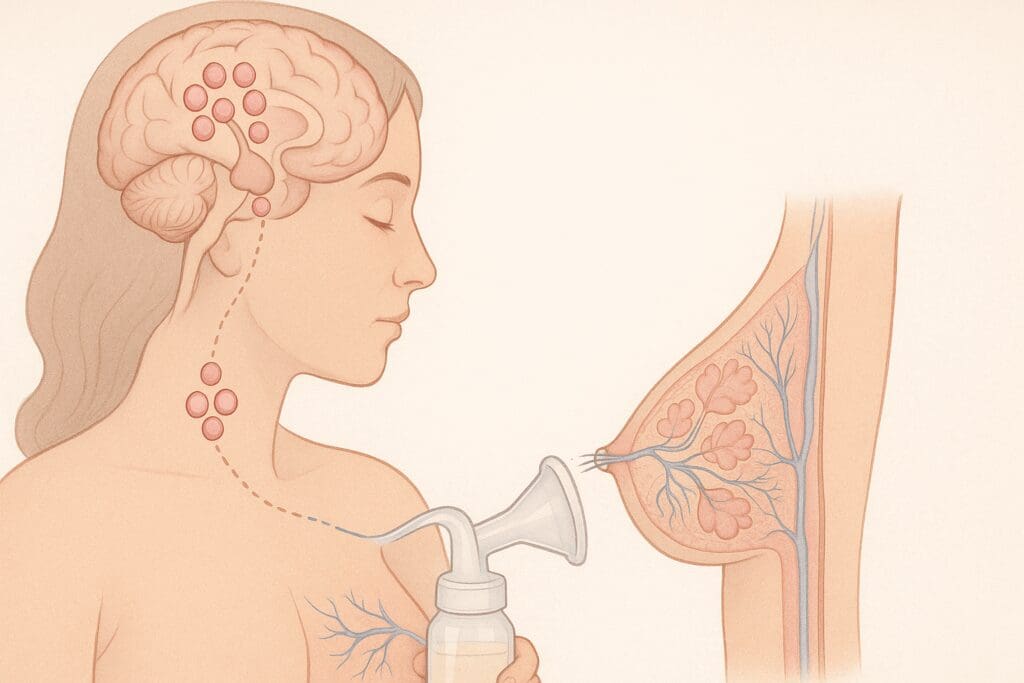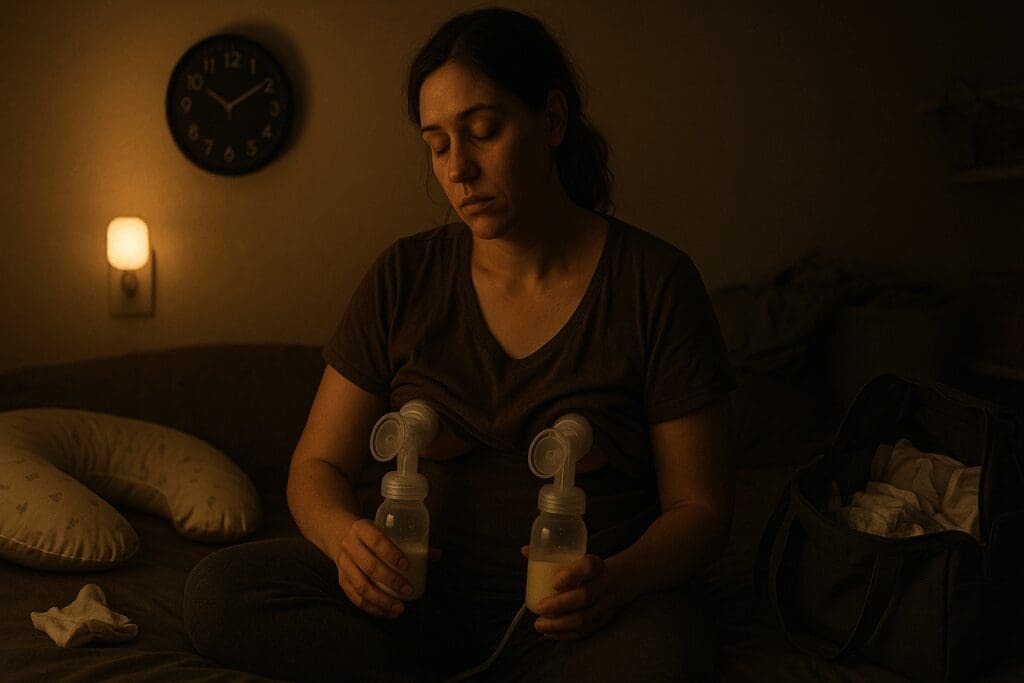The journey into motherhood is filled with joys, challenges, and learning curves that test the body and mind. One of the most common yet often misunderstood challenges new moms face is the overwhelming fatigue associated with breastfeeding and pumping. Many mothers wonder, “why does pumping make me tired?” This question emerges not just from isolated experiences but from a widespread reality that touches countless women. Understanding the physical, hormonal, and emotional dynamics of this fatigue is essential for managing expectations, improving self-care, and safeguarding maternal well-being.
Breastfeeding and pumping are far more than mere mechanical tasks. These processes involve an intricate interplay of biological responses, nutritional demands, and emotional investments. As the body engages in milk production and expression, it undergoes complex changes that can leave a mother feeling drained. The fatigue is not imagined; it is real, and it deserves to be addressed with clarity, compassion, and evidence-based insights. This article unpacks the roots of breastfeeding-related exhaustion, explores practical coping strategies, and offers expert guidance to help mothers feel more empowered and supported during this pivotal phase.
You may also like: 7 Surprising Breastfeeding Facts Every New Mom Should Know for a Confident Start

Understanding the Physiology of Pumping Fatigue
To comprehend why pumping makes so many mothers tired, it is important to examine what happens biologically during the pumping process. When a mother begins to pump, her body initiates the milk ejection reflex, commonly referred to as the “let-down.” This reflex is governed by the release of the hormone oxytocin, which not only enables milk to flow but also promotes a sense of calm and relaxation. While this effect is intended to facilitate bonding and comfort, it can inadvertently induce drowsiness or feelings of lethargy. In other words, the very hormone that makes breastfeeding emotionally nurturing can also contribute to sleepiness.
In addition to oxytocin, the hormone prolactin plays a central role in milk production. Prolactin levels surge during and after pumping sessions, preparing the body for the next round of feeding or expression. However, high prolactin levels have also been associated with decreased energy and mental fog, which might explain why so many new moms describe feeling foggy or slow after pumping. Furthermore, the hormonal shifts associated with postpartum recovery amplify the energy toll. As a result, the question of why does pumping make me tired is not simply a reflection of inconvenience or discomfort; it is rooted in authentic biological processes.

Caloric and Nutritional Demands of Milk Production
Another critical factor that contributes to pumping-induced fatigue is the enormous nutritional demand placed on the mother’s body. Producing breast milk requires significant energy expenditure. Studies suggest that lactating women burn an extra 300 to 500 calories per day solely through milk production. This energy demand is equivalent to running a moderate-distance race daily. If a mother is not consuming enough calories or staying hydrated, her body quickly falls into an energy deficit.
Inadequate nutrition during this time can have a compounding effect on fatigue. Essential nutrients like iron, magnesium, and B-vitamins are crucial for cellular energy production, yet they are often depleted during the postpartum period due to blood loss, physical exertion, and the energy demands of caregiving. Moreover, fatigue is exacerbated if the mother is struggling to eat balanced meals amidst caring for a newborn. Thus, understanding the nutritional underpinnings of postpartum fatigue is critical for formulating strategies that address the root causes rather than merely the symptoms.
The Emotional and Cognitive Toll of Pumping
Pumping is often framed as a mechanical, routine task, but the emotional labor associated with it should not be underestimated. Many mothers report feeling isolated, pressured, or even anxious during pumping sessions. Unlike direct breastfeeding, which often involves moments of quiet bonding, pumping can feel clinical and repetitive. It may require waking during the night to maintain supply or pumping at work under time constraints. Over time, this sense of obligation and detachment can lead to emotional fatigue, a form of burnout that is just as real as physical tiredness.
In this context, the question “why does pumping make me tired” becomes multidimensional. The cognitive load of constantly tracking feedings, ounces expressed, and scheduled sessions adds another layer of mental exhaustion. When combined with sleep deprivation and lack of support, the emotional fatigue from pumping can become overwhelming. This is especially true for mothers who face challenges like low milk supply, clogged ducts, or negative body image. Such stressors compound the fatigue and can lead to heightened anxiety or depressive symptoms, which further drain energy levels.

Why Does Pumping Make Me Tired? Hormones, Hydration, and More
Delving deeper into hormonal dynamics reveals even more about why fatigue is a common companion to pumping. The postpartum period is characterized by fluctuating levels of estrogen and progesterone, which influence mood, energy, and sleep cycles. In the first few weeks after delivery, these hormones drop sharply, contributing to what many mothers describe as the “baby blues.”
Beyond these primary hormones, oxytocin and prolactin contribute to a paradox: they are vital for milk production and maternal behavior, yet they can also prompt drowsiness and reduce alertness. The lull created by these hormones during and after pumping can be profound, often leading mothers to feel as though they could nap immediately afterward. This hormonal interplay underscores why does breastfeeding make me sleepy and illustrates that these feelings are not signs of weakness, but rather biological reactions.
Hydration status also plays a significant role. Breast milk is composed of approximately 87% water, and mothers lose substantial fluids through regular pumping. Even mild dehydration can impair cognitive performance and amplify fatigue. Many new mothers, preoccupied with caring for their infant, often forget to drink enough fluids, especially before or during pumping. Therefore, rehydration is not just beneficial; it is essential.
Does Nursing Make You Tired the Same Way as Pumping?
Though pumping and nursing both rely on similar hormonal pathways, the experience of fatigue can differ slightly between the two. Nursing often takes place in a comfortable, emotionally supportive environment, reinforcing the natural oxytocin response and fostering a sense of well-being. On the other hand, pumping can be more detached from the baby, potentially reducing the emotional gratification that helps counterbalance hormonal drowsiness.
Still, the physical and hormonal processes are strikingly similar. The same caloric expenditure, oxytocin release, and prolactin surges occur whether milk is expressed through nursing or a pump. Therefore, does nursing make you tired is a valid question with a definitive yes—just as pumping can cause fatigue, so can breastfeeding, especially in the absence of adequate rest and nutrition. This shared reality reinforces the need for new mothers to receive consistent support, regardless of how they choose or need to feed their infants.

The Role of Sleep Deprivation in Postpartum Fatigue
Sleep deprivation is perhaps the most universally acknowledged challenge of new motherhood, and it plays a central role in why pumping makes women tired. Interrupted sleep, particularly during the early weeks, leads to a cumulative sleep debt that is difficult to repay. Even when a mother manages to nap between feedings or pumping sessions, the fragmented nature of this sleep reduces its restorative benefits.
Research shows that sleep deprivation affects nearly every aspect of physiological and cognitive functioning. It impairs memory, slows reaction times, and decreases emotional regulation—all of which are already strained in the postpartum period. When layered with the physical toll of pumping, the effects become even more pronounced. New moms may find themselves falling asleep during pumping sessions, forgetting to clean equipment, or experiencing mood swings. This is not a failure of character or willpower; it is a biological response to sustained exhaustion. Recognizing this can help mothers feel validated rather than ashamed.

Strategies for Managing Pumping-Related Fatigue
While the fatigue associated with pumping is deeply rooted in biology, there are practical strategies that can help manage it. First and foremost, optimizing nutrition is crucial. Meals rich in complex carbohydrates, healthy fats, and lean protein can provide sustained energy, while iron-rich foods can help combat anemia-related fatigue. Incorporating B-vitamins—particularly B12 and folate—can enhance cellular energy production, which is especially important for breastfeeding mothers.
Hydration is equally essential. Keeping a water bottle near the pumping station and making it a habit to drink before, during, and after each session can significantly reduce feelings of fatigue. Some mothers find that adding electrolyte-rich drinks helps replenish what is lost through milk production.
Equally important is rest. While it may not be feasible to sleep uninterrupted for long periods, taking strategic naps or going to bed earlier can help reduce sleep debt. Delegating responsibilities to partners, family members, or friends can also carve out time for rest. It is vital to reframe rest as a necessary component of caregiving rather than a luxury.
Creating a comfortable pumping environment can also make a difference. Using a supportive chair, setting up calming music, or practicing deep breathing during sessions can help reduce emotional stress. Some mothers benefit from watching videos or looking at pictures of their baby to stimulate oxytocin and foster emotional connection during pumping. These small changes can have a significant impact on how draining the experience feels.
Why Does Breastfeeding Make Me Sleepy? Understanding the Neurological Links
Beyond hormonal explanations, the question of why does breastfeeding make me sleepy has neurological underpinnings. Breastfeeding and pumping activate the parasympathetic nervous system, which governs relaxation and digestion. This system, when activated, slows the heart rate and lowers blood pressure, promoting a restful state. While beneficial for bonding and calmness, this state can also make a mother feel incredibly sleepy.
Moreover, the repetitive and rhythmic nature of breastfeeding and pumping has a meditative quality that lulls the brain into a relaxed state. Combined with warm skin contact, gentle baby movements, or soothing background sounds, the conditions are ideal for drowsiness. This explains why many mothers find themselves nodding off during night feedings or struggling to stay awake while pumping in the early hours.
In addition to promoting relaxation, the parasympathetic response also contributes to a sense of vulnerability. Mothers may feel emotionally exposed or more susceptible to anxiety, especially when they are already tired. Acknowledging the neurological components of this sleepiness is essential for creating realistic expectations and reducing guilt. It also underscores the importance of postpartum mental health support.
When to Be Concerned About Excessive Fatigue
While it is normal to feel tired after pumping, excessive or persistent fatigue may be a sign of an underlying issue. Postpartum thyroid disorders, such as hypothyroidism, can mimic typical postpartum fatigue but require medical treatment. Symptoms such as extreme lethargy, weight gain, and cold intolerance should not be ignored.
Similarly, iron-deficiency anemia is common after childbirth, especially for mothers who experienced significant blood loss. Fatigue in this context is often accompanied by dizziness, shortness of breath, and pale skin. A simple blood test can confirm this condition, and dietary changes or supplements can restore energy levels.
Postpartum depression and anxiety can also manifest as chronic fatigue. Mothers may find it difficult to get out of bed, feel overwhelmed by basic tasks, or lack interest in activities they previously enjoyed. Emotional and physical exhaustion often go hand-in-hand in these cases. Seeking help from a healthcare provider is not just advisable; it is essential. Treatment options, including therapy and medication, can dramatically improve quality of life and maternal-infant bonding.
Building a Supportive Environment for New Mothers
Reducing the fatigue associated with pumping requires more than individual effort; it demands systemic support. Healthcare providers should proactively discuss the potential for fatigue during lactation and offer resources such as lactation consultants, mental health professionals, and nutritionists. Employers can also play a pivotal role by providing flexible pumping schedules, private lactation spaces, and supportive leave policies.
Partners, family, and friends should be educated about the realities of postpartum fatigue so they can offer meaningful support. This might include taking over household chores, preparing meals, or simply providing a listening ear. A culture that normalizes rest, validates maternal fatigue, and encourages shared caregiving can alleviate much of the burden that new mothers carry.
Mothers themselves can benefit from connecting with peers through support groups or online communities. Sharing experiences, frustrations, and tips can foster a sense of solidarity and reduce feelings of isolation. Knowing that others are grappling with the same question—why does pumping make me tired—can be deeply reassuring.
Reclaiming Energy and Joy During the Postpartum Period
Ultimately, the goal is not to eliminate fatigue altogether—a nearly impossible feat during the early months of motherhood—but to manage it in ways that preserve well-being and nurture joy. By understanding the hormonal, nutritional, neurological, and emotional roots of pumping-related tiredness, mothers can make informed choices and advocate for their needs.
Embracing a mindset of self-compassion is vital. Rather than striving for perfection or productivity, new moms should be encouraged to prioritize healing, bonding, and rest. In doing so, they can navigate the challenges of pumping and breastfeeding with resilience, grace, and hope.
FAQ: Navigating Postpartum Fatigue and Pumping Challenges
Why Does Pumping Make Me Tired Even When I Sleep Well?
Even with consistent sleep, many women still ask, “why does pumping make me tired?” because fatigue related to milk expression stems from more than sleep deprivation. The act of pumping engages the parasympathetic nervous system, leading to a deep relaxation response that can feel like sudden exhaustion. This reaction is rooted in hormonal cascades—particularly oxytocin and prolactin—which promote calmness but can also induce drowsiness. Additionally, pumping requires significant physical energy and depletes calories, fluids, and micronutrients that aren’t always replenished effectively, even with a good night’s rest. The body’s subtle but constant recovery from childbirth, layered with the physical exertion of milk expression, creates a persistent low-grade fatigue that sleep alone cannot resolve.
Does Nursing Make You Tired Because of Hidden Postpartum Conditions?
Yes, nursing can exacerbate fatigue if underlying health conditions go undiagnosed. One example is postpartum thyroiditis, which can cause both hyperthyroid and hypothyroid phases, each affecting energy differently. Women may also experience lingering anemia from delivery-related blood loss or nutrient depletion that intensifies feelings of tiredness during or after nursing sessions. In addition, women with undiagnosed postpartum anxiety or depression often report physical exhaustion as a primary symptom. While the hormonal aspect of lactation does contribute to tiredness, it’s crucial for mothers to explore medical evaluations if they feel persistently drained beyond the expected adjustments of new motherhood.
Why Does Breastfeeding Make Me Sleepy More at Night Than During the Day?
The sleep-inducing effect of breastfeeding is often heightened at night due to the body’s circadian rhythm and increased melatonin levels. Melatonin, which naturally rises in the evening, works synergistically with oxytocin to create a stronger sedative response during nighttime feedings. Furthermore, the cumulative physical and emotional fatigue from the day may make women more susceptible to the sleepy effects of breastfeeding. Environmental factors also contribute—dim lighting, quiet surroundings, and relaxed posture all intensify the neurological cues that tell the body it’s time to rest. As a result, the question “why does breastfeeding make me sleepy?” tends to be especially relevant in evening or overnight sessions, when natural sleepiness is already peaking.
Can Certain Pumping Techniques Reduce the Feeling of Fatigue?
Yes, adopting specific techniques can lessen the extent of post-pumping fatigue. Using hands-free pumps or wearable devices reduces the need for physical strain and encourages multitasking or mindfulness practices that can stimulate alertness. Breast massage before and during pumping can improve milk flow efficiency, which shortens session duration and conserves energy. Adjusting suction levels for comfort rather than maximum expression can also prevent unnecessary stress on the body. Additionally, pairing pumping with music, podcasts, or guided meditations may elevate mood and cognitive stimulation, offsetting the sedative hormone response. Strategic hydration and snacks during pumping can provide immediate fuel to support alertness as well.
Why Does Pumping Make Me Tired If I’m Already Well-Nourished and Hydrated?
Even when nutritional needs are met, pumping can still lead to tiredness because it requires continuous metabolic output and hormonal regulation. The question “why does pumping make me tired” has to be examined beyond basic energy intake. For instance, frequent pumping sessions can cause minor but chronic muscle tension in the shoulders, arms, and back, especially if posture is poor. These micro-strains deplete physical energy over time. Also, some mothers may have excellent nutrition but experience emotional fatigue or overstimulation from the mechanical and repetitive nature of pumping, which affects mental stamina regardless of physical wellness. Therefore, rest and mindfulness must accompany nutrition to fully combat fatigue.
Does Nursing Make You Tired Longer-Term or Only in the Early Weeks?
Fatigue from nursing can persist well beyond the initial postpartum period, especially if feeding patterns remain intense or irregular. As babies grow, they often go through growth spurts that increase nursing frequency, renewing the cycle of hormonal surges that contribute to tiredness. Also, mothers returning to work and balancing multiple roles may experience compounded fatigue from nighttime feeds and day-time responsibilities. While the body may gradually adjust to the hormonal changes, emotional and cognitive demands can increase, keeping fatigue levels elevated. Hence, “does nursing make you tired?” is not just a short-term concern—it can remain relevant for as long as breastfeeding continues without adequate support or lifestyle adjustments.
Why Does Breastfeeding Make Me Sleepy When I’m Trying to Stay Alert for Baby Care?
This paradox is frustrating for many mothers, especially during nighttime feeds or when they need to monitor their infant closely. The body’s oxytocin response is biologically designed to calm and soothe, which is excellent for bonding but counterproductive when vigilance is required. The challenge lies in breastfeeding’s dual effect—it supports infant well-being but impairs maternal alertness. Techniques such as feeding in a semi-upright position, keeping lights dim but not dark, and engaging in light mental stimulation (like soft music or conversation) can help counterbalance the sleepy response. Understanding that “why does breastfeeding make me sleepy” isn’t a flaw, but a design of human biology, can help mothers prepare with strategies that preserve both safety and bonding.
How Do Mental Health and Emotional Load Contribute to Pumping Fatigue?
The emotional labor behind pumping is often invisible but powerful. Constantly tracking output, maintaining supply, and meeting feeding goals can create chronic stress that drains mental resources. Mothers who struggle with expectations—whether self-imposed or external—may internalize guilt or frustration if pumping isn’t going well, compounding emotional fatigue. The repetitive nature of pumping also lacks the interactive feedback of nursing, which can lead to feelings of detachment or loneliness. These emotional stressors can manifest physically, making the fatigue from pumping not just a matter of energy expenditure but psychological load. Addressing the emotional component is essential for resolving the broader question of why does pumping make me tired.
Can Lifestyle or Environmental Factors Intensify the Tiredness Associated with Pumping?
Absolutely. Environmental factors such as poor ergonomics, ambient noise, or lack of privacy can make pumping sessions more stressful and physically draining. Pumping in uncomfortable positions or without proper back support can cause muscle fatigue that lingers. Interruptions during pumping can activate a stress response that interferes with milk flow, prolonging sessions and increasing exertion. Even something as subtle as the temperature of the room or lack of sensory comfort—like dim lighting or soothing scents—can affect how restorative or taxing a session feels. Mothers who proactively design their pumping space with comfort, privacy, and calmness in mind often report significantly lower fatigue levels.
Why Does Pumping Make Me Tired When I’m Doing Everything “Right”?
The reality is that even with ideal nutrition, hydration, sleep, and technique, pumping can still lead to tiredness because of the fundamental physiological demands it places on the body. Mothers are often led to believe that if they follow all the recommended guidelines, they shouldn’t feel tired—but this expectation can be misleading and even harmful. The question “why does pumping make me tired” needs to be answered with compassion and realism: it is a natural consequence of sustained biological effort. Just as athletes need rest after performance, mothers need recovery time from the exertion of milk expression. Acknowledging this truth without guilt is a vital part of maternal well-being and long-term postpartum health.
Empowering Insights: Navigating Pumping Fatigue with Confidence and Care
For every new mom who has quietly asked herself, “why does pumping make me tired?” the answer lies in a complex web of biological, emotional, and lifestyle factors. Fatigue is not a weakness or a failure; it is an expected and understandable response to the demands of motherhood. Whether it stems from hormonal shifts, nutritional deficits, or the sheer emotional labor of caregiving, it deserves acknowledgment and support.
This journey is one of the most transformative experiences a woman can undertake. By demystifying the causes of breastfeeding fatigue, recognizing early warning signs of deeper issues, and offering actionable strategies, this article aims to empower mothers with the tools they need. With compassion, knowledge, and community, every mother can reclaim her energy, embrace her new identity, and navigate the beautiful, messy, and miraculous world of motherhood with confidence.
Further Reading:
Does Breastfeeding Make You Tired?
Breastfeeding makes me feel tired — here’s how to combat postpartum fatigue
Does Breastfeeding Make You Tired? Tips to Keep Your Energy Up



